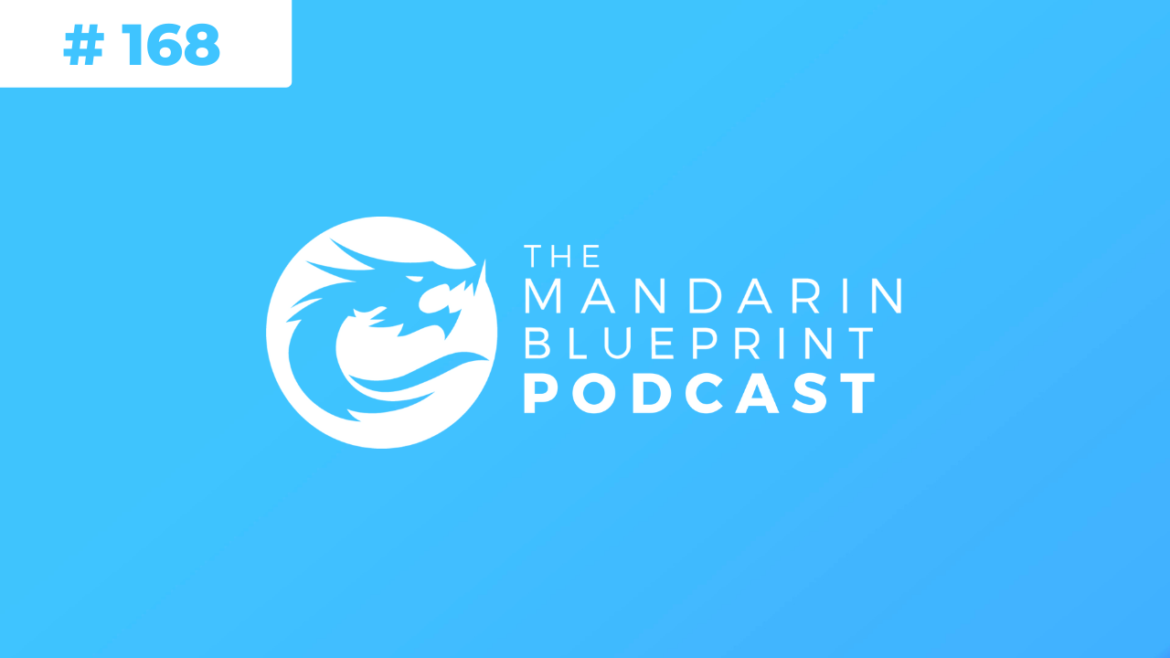
168. The Many Mandarin Milestones
欢迎光临! Welcome!
You can now subscribe to the podcast by the links below, or you can subscribe by copying the following URL into your favorite podcast APP.
The Mandarin Blueprint Podcast focuses primarily on The Blueprint online curriculum. Creators Luke Neale & Phil Crimmins answer questions and comments, discuss topics related to China and Mandarin learning, and have special guests.
Want to learn how to speak fluent Chinese fast? Join our free Webinar right here.
欢迎光临! Welcome!
You can now subscribe to the podcast on iTunes, Stitcher, Spotify, or you can subscribe by copying the following URL into your favorite podcast APP:
https://www.mandarinblueprint.com/feed/podcast/
The Mandarin Blueprint Podcast focuses primarily on The Mandarin Blueprint Method online curriculum. Creators Luke Neale & Phil Crimmins answer questions and comments, discuss topics related to China and Mandarin learning, and have special guests.
0:00 Affiliate Link & Reviews
Become a Mandarin Blueprint Affiliate
Leave us a Google Business Review 🙂
3:43 Comments & Emails
Gregory Savage by Community
Hello, I have been working strongly on this since Febuary last year. Today is the day I do character 592, end of the basic course. I haven’t done as much with sentences so I will suspend playing character games till characters, sentences and stories are marching together. Currently I am in a bit of a lockdown in Dongguan but with 6 new characters to explore, who cares? I must admit to enjoying the gamification of the study method. I love unpiecing the pronunciation and the meaning etc from the couple of prompts given. It does stick in my head despite being a “bear of little brain”. Tried other methods. These ones didn’t work for me. Pimsleur, Micheal Michele , Chinese girlfriends. The last one was particularly unsatisfactory as they only wanted to learn English. I also went on a week long course in Yangshou. It would have been effective if I stuck around for 6 months but I have to work. Time to get a teacher and start putting all that comprehensible input into sentences, conversation and stories. ?
8:37
Sabina Stodulski on Navigating Phase 1 Level Reviews
Hey! Just wanted to offer an observation
I didn’t see 中午 in the word progress. Unless I’m totally missing something here… anyways… I know the Mandarin Blueprint is your baby and your constantly making it better and adding value and you should be super proud!!! Phil and Luke— you guys are not just genius—- you guys are epic innovators!
Thank you ??
10:01
Mirko R on Make a Movie 辆
Would it make sense to have a prop that stands for “measure word” so that you know you’re dealing with a classifier?
12:38
Micaela Ellison on 约 in Context
Based on the English translations of “appointment” and “date”, I had the sense 约 was formal. But some of these examples appear to be more casual (a bit hard to tell without more context). So if I were planning to meet up with an old friend and we set a specific day and time, but otherwise there was nothing “formal” about the occasion, could I still use 约?
14:16
Christopher Glover on MAKE A MOVIE 四
I’m just wondering… why is it the male actor for sì and not a female actor? If there’s no final for it, then doesn’t si count as the initial?
16:26
Clare Murphy on 其他 in Context
Thanks Chad! I am moving more slowly through the course because of a heap of external stuff. But I do Anki every day, listen to cheesy C-Pop, watch even cheesier C drama and try to add a couple of characters a week. It gives me a fantastic sense of achievement amid all the other (largely really not-fun) stuff I have to deal with. The bite-size approach is perfect for me and squeezing in Chinese new learning and consolidation has just become second nature to me now.
18:20
Annette Bicknell on Level 23 Complete
Lots of stories/dialogues in this level and I am happy to find that reading these has become easier since they first showed up. You are absolutely right in that the first time you see something new it is the hardest and persistence pays off. I only transfer the 80% speed female and male audio to my smartphone. I know from other languages that speed is something that will come naturally as one’s skills reach higher levels so I am not worried about that at all. I get plenty of native speed when watching TV. With Chinese being so context heavy it is very enjoyable to read paragraphs. Sure, there are sentences I struggle with, especially if they are a bit heavy on the top down words, but the more I see them in my flashcards, the more my brain wraps itself around them. I also find that taking a few days to go through sentences and paragraphs/dialogues provides my brain with a regular brake from learning new words which then have time to solidify as I see them in context. By the time I have gone through all the sentences and stories/dialogues, I am ready and energized to learn new words. I have always liked variety and MB does exactly that.
23:19
Ole GT on Time to Get Real About Sentences
Whoa, this was an awesomazing experience, reading and understanding this stuff 😀
27:34
Micaela Ellison on 一切 in Context
我不相信他说的一切。
The translation above says “I don’t believe anything he said.” But it seems like this sentence could also be translated as “I don’t believe everything he said” or even as “I don’t believe everything he says.” Does it all just depend on the context?
29:17
Chris Lewis on 下课 in Context
周一, 星期一are they interchangeable?
29:55
kym Thomas on Make a Movie 毕
What’s the difference between 毕 and 全, are they interchangeable?
31:43
Sabina Stodulski on MAKE A MOVIE 识
Sorry… so “shí” is both ten 十 and 识 ? please and thank you
34:19
Steve Muir on Simple Final O: Introduction with 哦 ò
Hi, I’m loving this course so far, and especially enjoy the musical aspect of the tones (I’m a musician by profession).
Do I need to ADD new cards each and every day to Traverse? (I’m not using Anki.) I’m reviewing every single day so far, but once or twice I’ve not started a new video lesson the following day, and instead have gone back over the same few videos from the previous day because I haven’t quite understood everything.
Is this ok with the Traverse algorithm? Or must I add new cards every day to avoid messing up Traverse?
Thanks for a fantastic course so far!
Steve
36:42
Eileen Hollinger on Pick a Prop 人 亻
Does the 亻radical mean masculine, or like mankind/humankind? Could it be someone who represents the pinnacle of humanity, instead of manliness?
37:33
Mein S on MAKE A MOVIE 干
I’m sure I’m not the first one to express both anxiety and excitement over this method—so many questions, what ifs—what if I get confused, get mixed up. But at the same time heartened to hear so many find this very useful, and obviously for you Luke and Phil to build a whole system around. I know it’s been used for ages and it’s worked for them, it should work for me too. I guess it’s just that I have not YET proven it to myself, and what if…this what if that. Anyway, i’m excited because if it does work, then I know I will have the POWER over this aspect of the language. I just need to follow the program and trust the process. Fingers crossed.
Mein (sounds like the state of Maine; a new lifetime member).
40:23
George J ? on 讨厌的人
In the sentence “让别人错认为他们什么都能做” could ‘错认为’ be replaced by ‘以为’ and would this change the meaning at all? Thanks.
41:22
Robert on 做 in Context
As described here Usage 2 – “to cook” :
I’m having a problem thinking of this word as “to cook”, IMHO it is easier for me to think of this as a case of the context which if the sentence talks about food or eating, then it allows you to shorten 做饭 to 做. A bit like 吃饭 can be shortened to 吃. is that OK to think of it that way?
42:48
Micaela Ellison on 刚 in Context
It seems like 刚 is functioning as a time word here. So can I switch the order of 刚 and 我 in the first sentence? 我刚看见你了。If so, is there any difference in meaning?
Similarly, could the other sentences be changed as well? For example:
刚我回家。
刚我吃完饭。
44:21
Micaela Ellison on 下班 in Context
In your response to Ric above, you said 才 could be switched with 就 to indicate getting off work early from the speaker’s perspective. That makes sense for the example in the podcast which uses a specific time (八点). But in the Anki sentence here:
我每天很晚才下班
I assume 就 can not replace 才 because the speaker is explicitly stating his/her perspective that the time is “very late.”
45:28
Micaela Ellison on 约完会就分手了
A few questions:
我再也不会见她了!I think this means “I will not see her again.” So what is the 也 adding to the sentence?
出什么事了?Is this a common phrase we can use to ask what happened whenever something appears to have gone wrong?
她和照片上的女人一点儿也不一样。My first thought was this sentence translates as “She looks a little bit different than her photo.” But I recall a grammar structure with 一 。。。也不(maybe also 都?) that translates something like “even … does not”. So I’m wondering if the meaning here is more like “She doesn’t look even a little bit like the woman in the photo.”
50:20
Katariina Salo on 银行 in Context
Is 那家 in “就在那家中国银行的后面。” attached to 中国银行 (“Just behind that building, the Bank of China”) or is it itself the thing that is just behind the Bank of China?
51:57
Maho Tao on It’s a Word! 下
So 楼下 means “downstairs” as a place/noun, and 下楼 means “to go downstairs” as a verb? Can these, or characters in these structures, be switched around, and the meaning becomes clear from the context, or the order of the characters defines the meaning? Thanks.
(Btw, the 2nd sentence has a typo: shǔi.)
53:52
George J ? on 课 in Context
Following up on the video, in this sentence:
我喜欢上中文课。
so does the 上 go with 喜欢 (喜欢上 – starting to like) or with 中文课 (上中文课 – going to Chinese class), or could it be either depending on context?
I knew 爱上 but 喜欢上 was new to me so I initially interpreted this as ‘I like going to Chinese class.’
56:07
Micaela Ellison on 出现 in Context
下雨过后,天空出现了彩虹。The second part of this sentence feels odd to me because it translates literally as “sky appeared rainbow.” I would have thought a preposition/relator would be needed. For example: 在天空出现了彩虹 or 彩虹在天空出现了。But apparently not?


